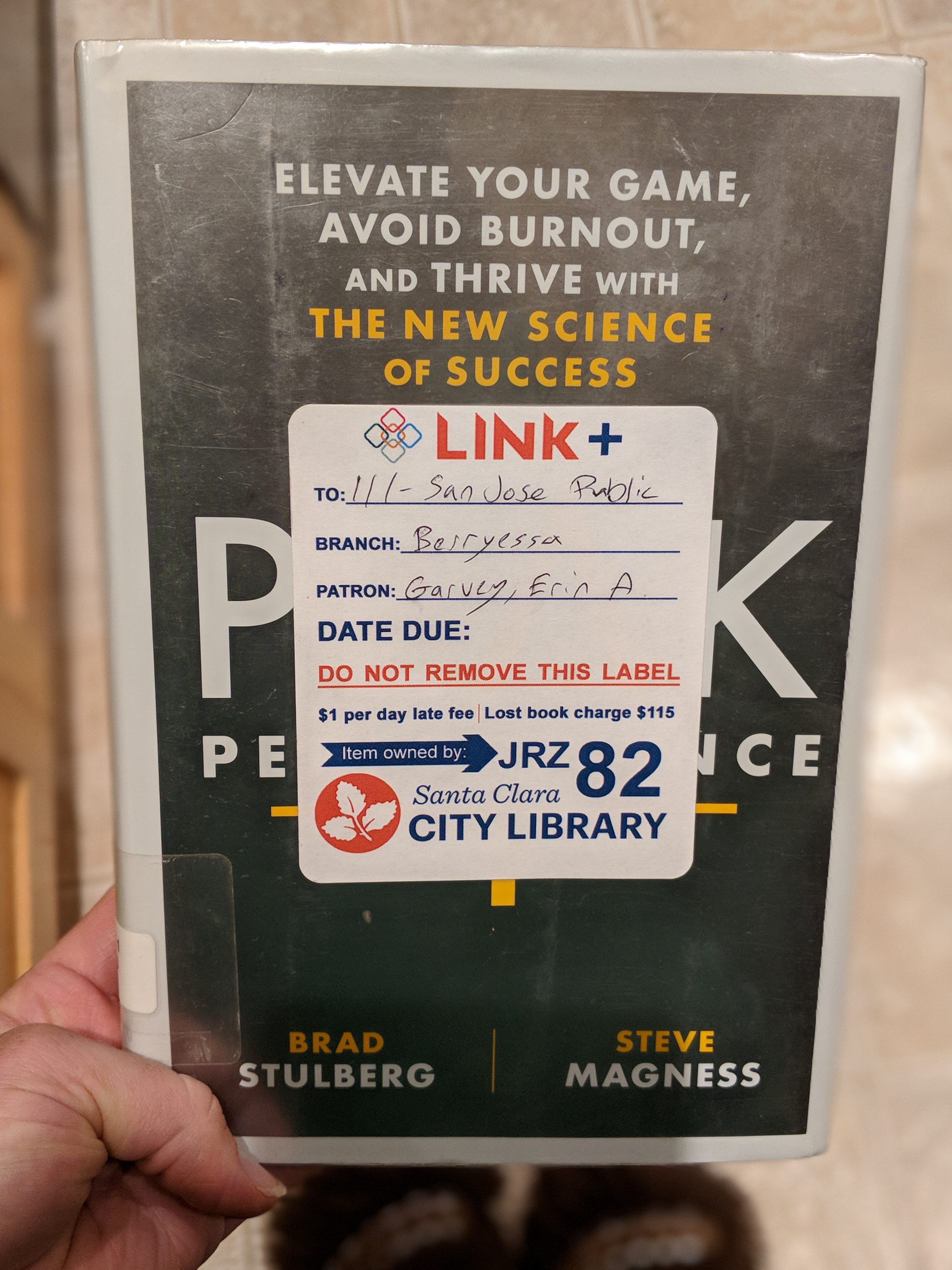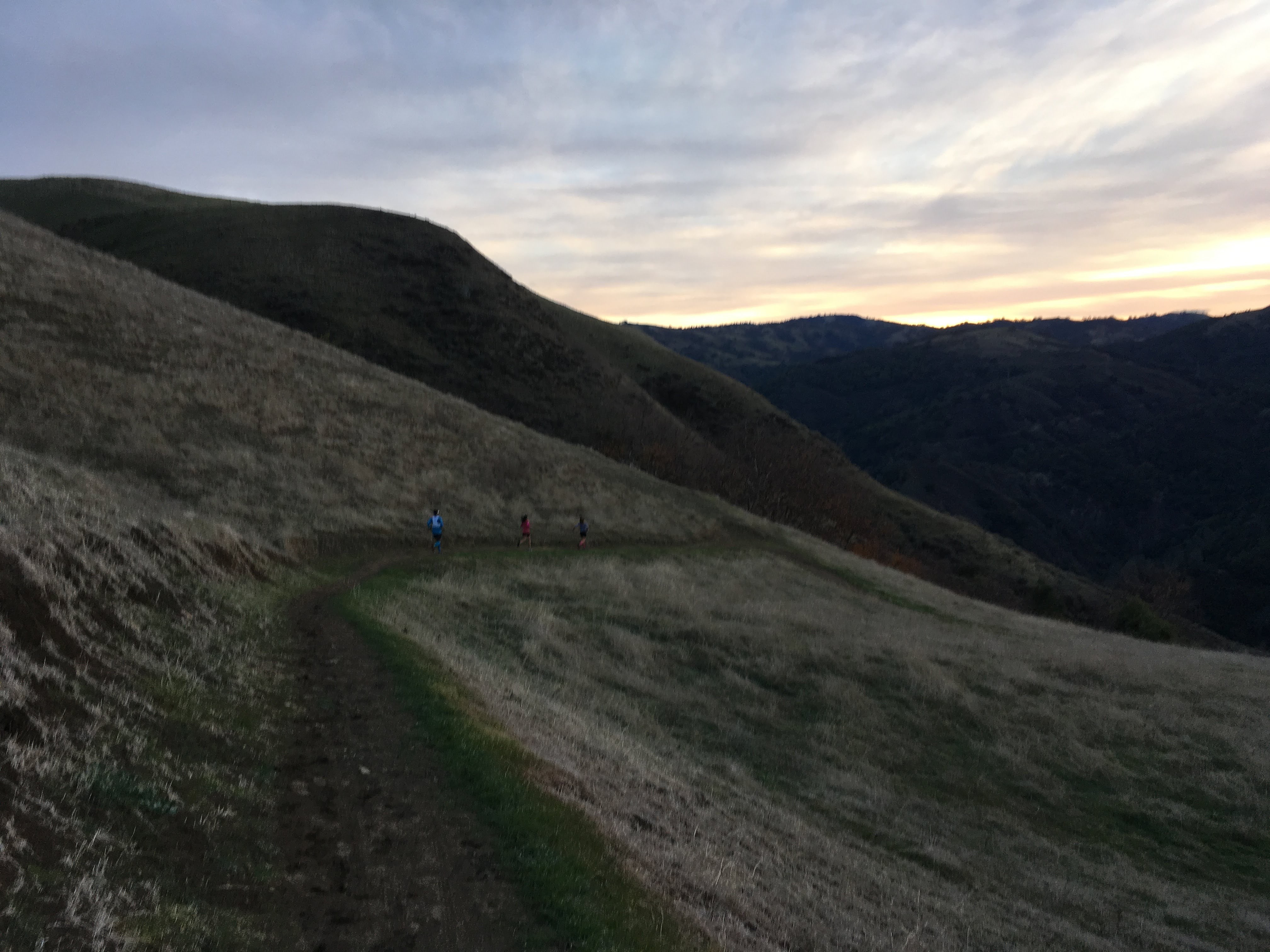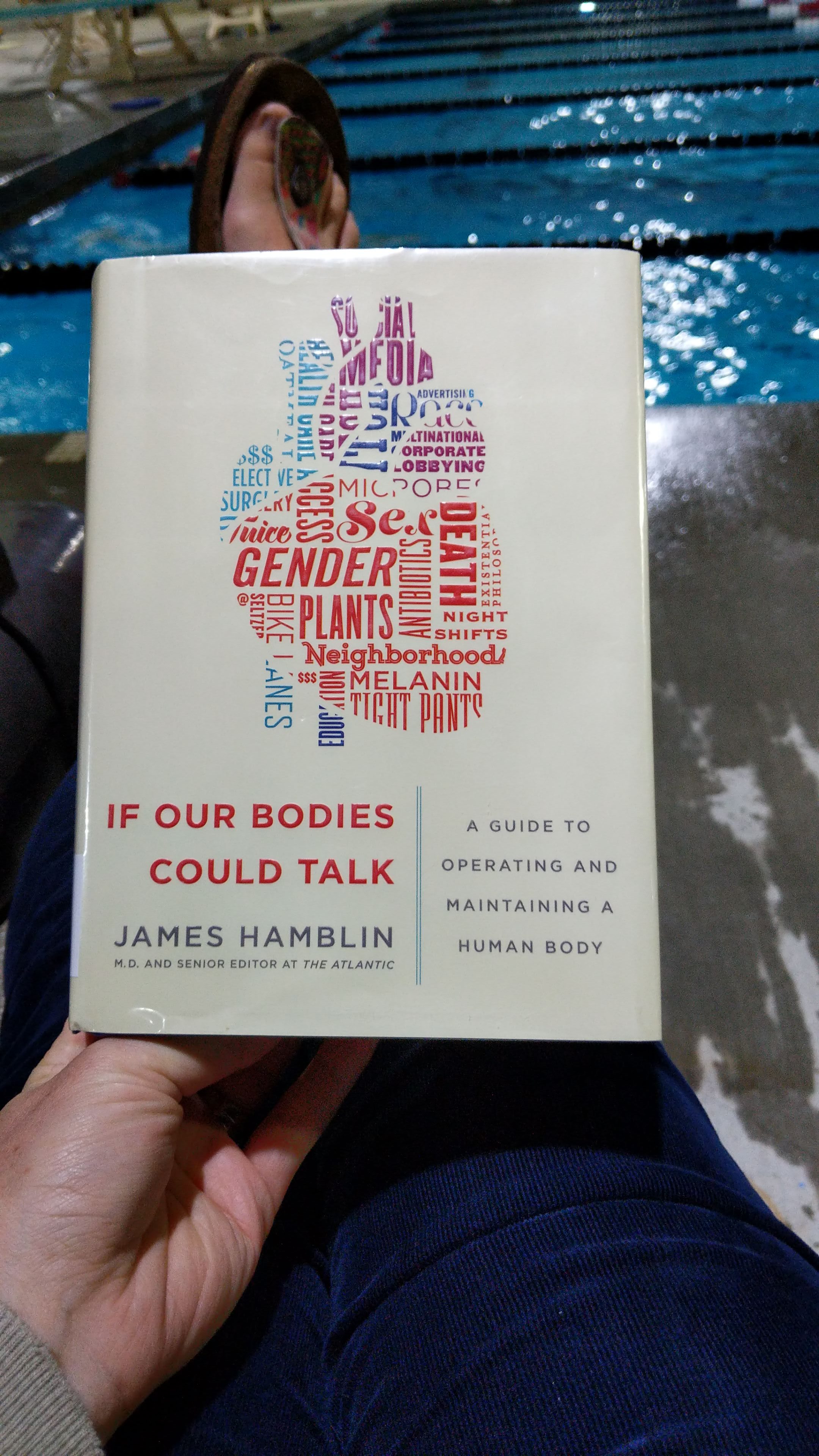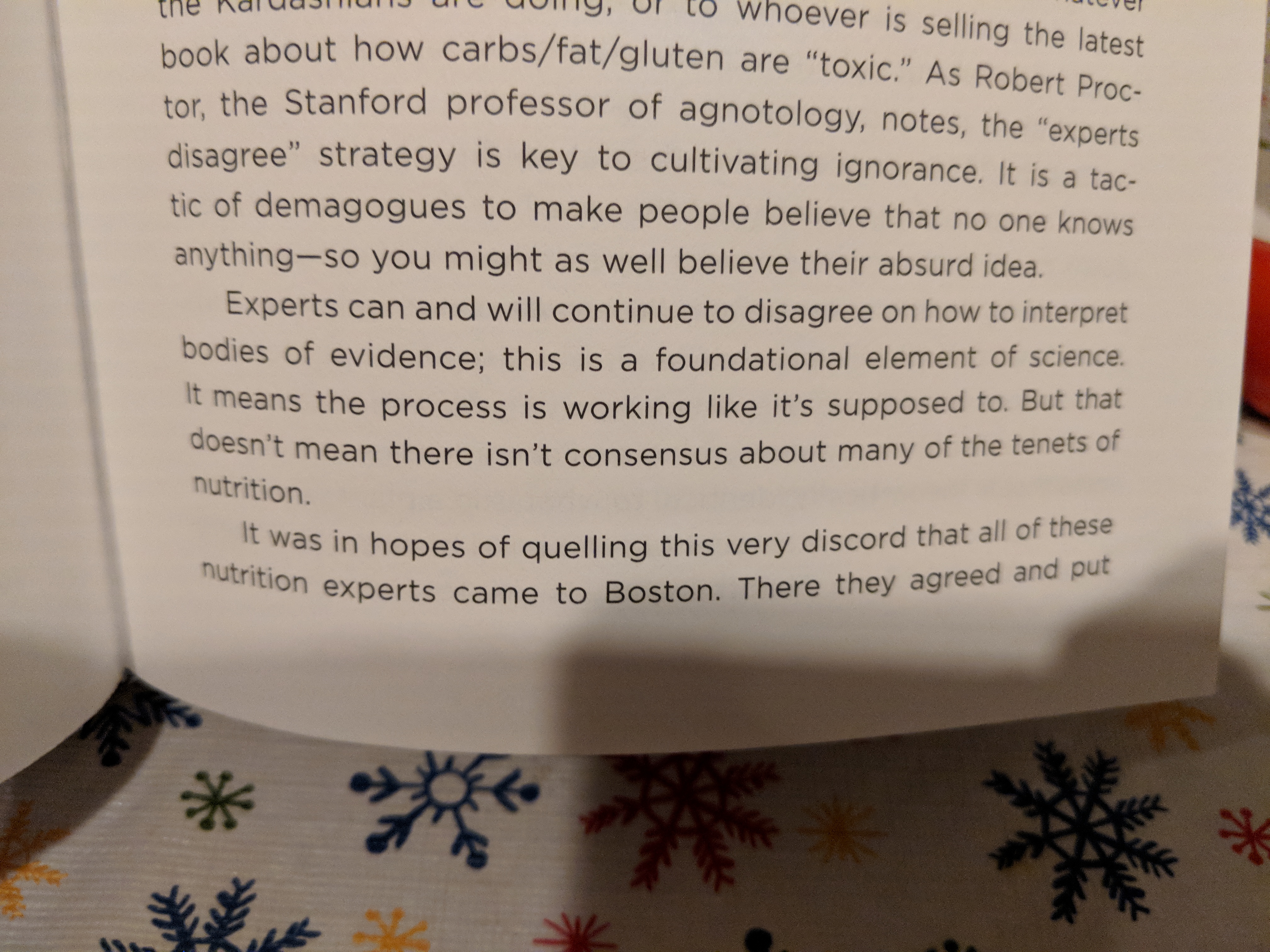Steve Magness and Brad Stulberg’s _Peak Performance_
I feel like the longer I’ve been a runner and thus immersed in this big ol’ running community, the more commonly I hear people — people who don’t currently run — lament that they could “never be a runner,” to which the common retort I hear is “if I can do this, anyone can.” When my friends talk about their simply unfathomable-to-me athletic accomplishments, like crazy fast times, super high weekly and monthly volume, long-ass and intense races like IM or ultramarathons, they, too, will often say that being able to complete those gargantuan feats ultimately boils down to mind over matter. Once they’ve made up their mind to do the thing, not much else will be able to stand in the way of them and said thing. It’s a choice, to be sure, but it’s a choice filled with a shit-ton of intention and deliberation, as well as innumerous decisions day in and day out to support that choice for weeks, if not also months (or years) on end.
With endurance events like marathons, halfs, and ultras becoming increasingly popular over the past 5-10 years, maybe it’s not so coincidental that there seems to also be an uptick in sports psych books that focus on the mental side of the game, the “if I can do this, anyone can” part. If anyone can allegedly do this stuff, what is it, exactly, that makes some of us more successful than others? If everything else is equal, if you take athletes who are physically primed for their race, have all their other variables set to a positive outcome (like not having any glimmers of injury or overuse, having gotten a sufficient amount of sleep, arriving to the race appropriately tapered, and having consumed a healthful diet, among others), how or why do some athletes just crumble, and others thrive?
From my armchair analysis and recall of the literature that’s popped up in the past 5 years, it seems that many subject matter experts would say that an athlete’s mental training — and capacity to mentally endure the going when the going gets really, really tough — is what will differentiate him/her from a competitor. The training that you post in the days/weeks/months preceding your race matters — absolutely — but your physical strength will only take you so far. When shit hits the fan and starts to fly mid-race, your mental game is what will ultimately save or sacrifice you.
Steve Magness and Brad Stulberg’s Peak Performance: Elevate Your Game, Avoid Burnout, and Thrive with the New Science of Success (published in 2017) is yet another contribution to this burgeoning sports psych canon for us laypeople. We plebeian athletes probably don’t have ready access or disposable income to reputable sports psychologists to make us killer weekend warriors and AG athletes, but damn if we can’t pick up a book published by Velo or Rodale and hope for the best. (A quick aside here to say that I got my copy from inter-library loan and that my commentary isn’t sponsored in any way; I just liked the book — and thought it worthwhile enough — to share about it).

You probably recognize Magness’ name from his time writing for both Running Times (RIP) and Runner’s World, his Science of Running blog, his coaching numerous World Champs and Olympic athletes, or the small fact that he was a whistleblower (along with Kara Goucher) against Alberto Salazar and Nike’s Oregon Project, circa 2015. He’s an exercise scientist and from my perspective, one of the most reputable out there. You may know Stulberg from his extensive writing contributions at Outside, New York, or Runner’s World, among others, when he wasn’t working at McKinsey and throwing down hugely impressive accomplishments, like reporting to the White House before he was 30. These guys know their stuff, and this work, especially when taken together with others like Angela Duckworth’s Grit and Matt Fitzgerald’s How Bad Do You Want It? can be really helpful to any of us who want to figure out ways to get our mental game on par with that of our physical. It’s so much more than mantras and power songs; there are systems involved, lots of intentional choices that we must make, and a fair amount of self-transcendence that will help us get to the top of our game, whatever our game may be.
The shitty thing about mental training, or in general, about breaking through plateaus and going beyond ourselves, for lack of a better phrase, is that it can be really tough. Captain Obvious here, for sure, but really, if you’ve ever done anything remotely “hard” in your life — whether it’s something in your professional life, an athletic pursuit, red-lining in a race, or hell, even trying to raise children who will grow up to be thoughtful and kind contributors to society — you know that sometimes — or realistically, most of the time — it’s far easier and more convenient to give in and quit than it is to stay the course and work hard. Sure, there may be some things in life that come more easily to us than others, but for the most part, if we want to improve, we’ve gotta put our head down and be willing to work for it. Many of us want to improve at something in our life (our professional duties, our athletic pursuits, whatever), but when it comes down to it, few of us really are willing to do the dirty, grinding work that begets real, meaningful, quantifiable or qualifiable improvement. It’s easy to dream big dreams; it’s hard to roll up our sleeves and go all in.

What’s weird, too — if not bizarre — is that for as positive/optimistic as many of us are, we tend to be profoundly adept at being horribly negative at the same time. We wouldn’t skip a beat in encouraging our friends on their own pursuits — work hard! You can do it! Relentless forward progress! — but when it comes to us realizing our own, we can think of a thousand different reasons why we’re going to fail and why we should just not even try, while we’re still ahead. Complacency is complacency for a reason, right? Whether consciously or not, we tend to self-sabotage, and if we’re not careful, we may start careening toward a dark place void of just about anything. Sound familiar?
In PP, Stulberg and Magness break down their ideas to “sustainable success” into three parts that focus on growth, priming, and purpose. In their words, PP teaches its readers “how to elevate their performance by optimally alternating between periods of intense work and rest; priming the body and mind for enhanced productivity; and developing and harnessing the power of a self-transcending purpose.” Admittedly, a lot of that sounds a bit wishy-washy and likely would have induced some eye-rolling on my part, had I not recognized Magness’ name and known his work. Stay with me, though. It’s not all keyword tiles on the Business Bullshit Bingo card; there actually is a lot of good stuff in there.
A lot of the information they give is pretty pragmatic, more focused on systems ops than anything, but some of it might surprise you. You likely already know the value of having a workspace that’s primed for your work, and you probably are well aware that it’s important to figure out when you work best — night versus day, for example — and to structure your day accordingly, or as much as you can anyway. Rituals, schedules, and predictability matter for a reason; this type of stuff is pretty straightforward and stuff I can remember teaching my first year, first quarter undergrads as a TA in their “welcome to college/here’s how to not fail out” seminar. You likely also already know or have experienced the value of surrounding yourself with the “right people” in your life, folks who will be supportive of you and your endeavors. Magness and Stulberg talk about all of this stuff in detail and provide the data and research to corroborate their claims (and even some neuroscience connections, when applicable, which was pretty interesting to read).
As runners, we probably know or have heard of the importance of the stress + rest = growth/adaptation cycle, but what surprised me was seeing how the authors applied the same principle to other aspects of life, ones that aren’t at all athletics-based, but are places wherein you have room to grow and consequently achieve a greater performance. In running, we can’t expect to work work work work work all the time, every day, all day and have a breakthrough; this is why runners who basically “race” most of their training runs wind up injured. Indeed, it’s during our periods of (deliberate, fruitful, purposeful) rest when we really reap the rewards of our hard work. So it goes, too, for non-athletic pursuits. (This is why so many major tech companies have designed their campuses the way that they have. It may be less expensive to just have a sterile, nondescript cubicle farm, but they know that their best engineers aren’t going to have their eureka! moment when they’re toiling away at their desk).

The authors provide a good amount of data and footnoted research that back up their assertions, and sprinkled in throughout the text are vignettes that feature people’s stories — athlete and layperson — that illustrate the point at hand. Unlike Fitzgerald’s book, which (IIRC) used an individual athlete’s extensive case study as each basis for his assertions, in PP the people profiles are considerably shorter and seem to serve more as augmentations to the principles. In essence, PP is more about the data and research findings and less on the story-telling, but I can assure you that it’s a completely accessible read. For as data- and science-driven as it is, it’s not like reading an annotated bibliography or anything like that, nor does it necessitate graduate-degree knowledge to understand their claims. PP and Duckworth’s Grit are on the proverbial same page in that way, and they both apply their findings to an array of disciplines, not restricting themselves to athletics or running, in particular. Anyone who would stand to benefit from improving their game — whatever that game is — could benefit from reading PP. Really.
Getting ourselves mentally stronger is really hard, and to be honest, some days it sucks. I mean, what can we expect? With running, when we are trying to get in shape to perform the best that we can for a particular race, sprinkled throughout the good/great days are ones that are less so, ones that are more along the ok/bad spectrum; not everything is the proverbial unicorns-shitting-rainbows. It can be tempting to think that all we have to do to increase our game is to read a bunch of sports psych books like PP, and voila! We will become Olympic-caliber! Of course, though, it doesn’t work like that. The only way we can increase our mental muscle is, well, just the same way we increase any of our muscles: by intentional and extensive use. It’s so much more than duking it out through a grueling workout and repeating some mantra that we’ve haphazardly made for ourselves; there’s a lot of behind-the-scenes work involved. PP walks you through that behind-the-scenes stuff.
More than anything, we have to allow ourselves to put ourselves in positions that we know will tax us (knowing we might fail, but hey! that’s ok! It’s part of the process) and just keep the thing, the thing, and do the damn thing, knowing that we’ll be ultimately better for it. It’ll be in those instances that we’ll be able to use the tips and knowledge we glean from books like Peak Performance, Grit, or How Bad Do You Want It? to work toward becoming more mentally resilient and more closely aligned with actualizing our potential.

At this point, I can’t say that this book has changed my life or anything comparably dramatic (I just finished it a day or two ago), but I can say that I felt it was a worthwhile use of my time, which is laudatory in and of itself. Some of their findings I’ve heard and read before, sure, because I enjoy the subject matter and have read others’ works that focus on the same, but I learned a lot of new information as well. I have a solid racing calendar that’ll be starting soon, and between that and all my other engagements, I will have plenty of opportunities to apply some of the PP findings to my own life. There are lots of things that I’m not at this point in my life — an Olympic-caliber athlete, a full-time working parent, an entrepreneur, or a full-time student, for example — yet I am wearing enough hats in my life in other respects that can lend to some personal growth and challenge, should I decide that I want to do more than skate by and hang with the status quo.
I think that’s the underlying crux of the book: this type of stuff is for everyone. You don’t have to be the best in your class. In fact, it’s a safe assumption that you’re probably not. That makes you … normal.
You can, however, probably do more, or do better, than what you’re doing right now. That’s also ok. That also makes you … normal.
The onus is ultimately on you to take the first step, and Peak Performance can be your guide in the process.


